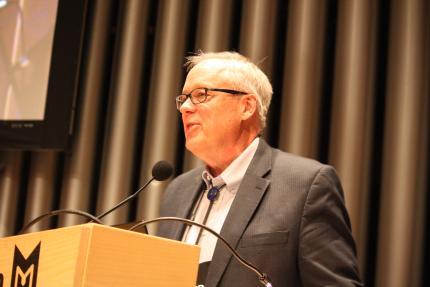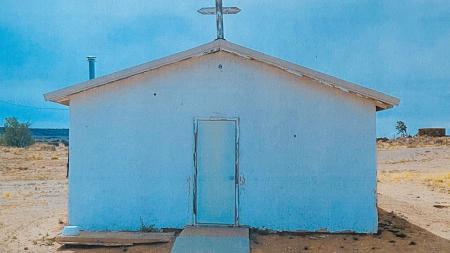Prioritizing Ministry for the Future

Dr. Steven Timmermans gives a State of the Church address to Synod 2019.
Gayla Postma
“I don’t need to tell you stories about what the church is doing,” Dr. Steven Timmermans told the delegates of Synod 2019 during his State of the Church address. “You are the work of the church. You have the stories. You know what God is up to. You don’t need me to come up here and knit it all together.”
At the same time, Timmermans wanted to use this opportunity to talk about some trends he sees as executive director of the Christian Reformed Church in North America.
“I would like to look at numbers tonight as a way to get to our next ministry plan,” he said.
Numbers can tell us a lot, but they can’t tell us everything, he pointed out. For example, he said, it is true that we have seen a decline in professing members as a denomination in recent past.
The reasons behind this decline are multivariate. Timmermans said that in some ways, we resemble the trends of mainstream denominations who have seen a steep decline in numbers.
He also noted that research has shown that increasing numbers of young adults prefer to remain unaffiliated rather than identify as members of a specific church. Demographics and birth rates also play a role.
At the same time, said Timmermans, these are not the only numbers we have at our disposal. In contrast to the decline in professing members, we also see an increase in urban areas and in the number of multi-ethnic and ethnic churches.
In urban Grand Rapids, for example, he said that we have seen an 11% increase in professing members. Similarly, if you look at our new congregations of the past year, 14 of the 16 were of ethnicities other than European descent or multi-ethnic.
There are many reasons that could be behind this overall decline in members and these increases in select populations, but Timmermans suggested that we not spend a lot of time trying to figure them out.
“Let’s not spend too much time on hypothesizing about numbers,” Timmermans said. Instead, he suggested that we spend time discerning the Holy Spirit’s leading as we consider how to move into the future.
He suggested that there are many ideas out there to suggest what we as a church should be focusing on. Some experts suggest, for example, that helping young adults hold on to their faith as they differentiate themselves from their families is key to the future of church health.
Other suggestions are to focus on intergenerational interactions, helping all members identify and use their gifts, mentoring, and focusing on non-traditional ministries.
Within the CRCNA itself, he added, there are many resources and tools available to help congregations.
“God has blessed this denomination with richness in resources. Do a lap around the second level here,” he said, referring to the dozens of exhibit booths on display during Synod 2019 from CRCNA ministries. “ Do you see all those resources here? Have you met all the people available to help you?”
But in the midst of this plethora of external ideas and wealth of ministry resources, there is a need to prioritize. A ministry plan helps us do that.
“It is really important that we bring a sense of direction and focus to local ministry with all of these riches,” said Timmermans. “We need to prioritize. We can’t do everything. We know that there are some things that are so necessary that we need to do them immediately. That’s why we have a ministry plan.”
The denomination’s current ministry plan, Our Journey 2020, is set to expire in about a year. To provide input into the next ministry plan, delegates spent time completing an online survey where they identified the issues and trends that are important to them and their local congregations.
92% of delegates said that we need to equip our churches to be more missional, and 85% suggested that congregations need to discover how to connect and reconnect with their local ministry contexts.
Other top priorities included an emphasis on engaging the younger generation, building bridges to newcomers in our communities, and becoming agents of reconciliation.
This input will be added to feedback gathered at the Canadian National Gathering and classis meetings and will inform staff and the Council of Delegates as they draft the next ministry plan.
“While many of you won’t be at next year’s synod, hopefully there will be a nearly complete ministry plan presented there to critique and embrace,” said Timmermans.
“In the meantime,” he added, “yes, do pay attention to the numbers. Do a little hypothesizing. But don’t spend all your time reflecting. Instead, act and step out with the Spirit. God has given the CRC an incredible task and incredible resources, now we need to use those resources to be a blessing to others.”
For continuous coverage of Synod 2019 including the live webcast, news, video recordings, photos, liveblog, social media links, and more visit www.crcna.org/synod.


